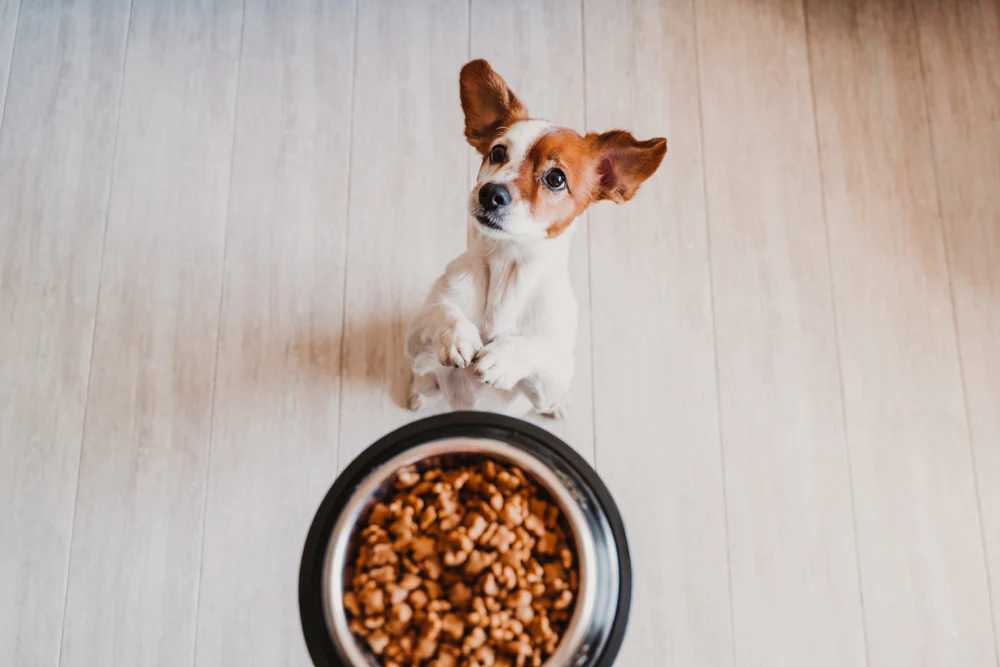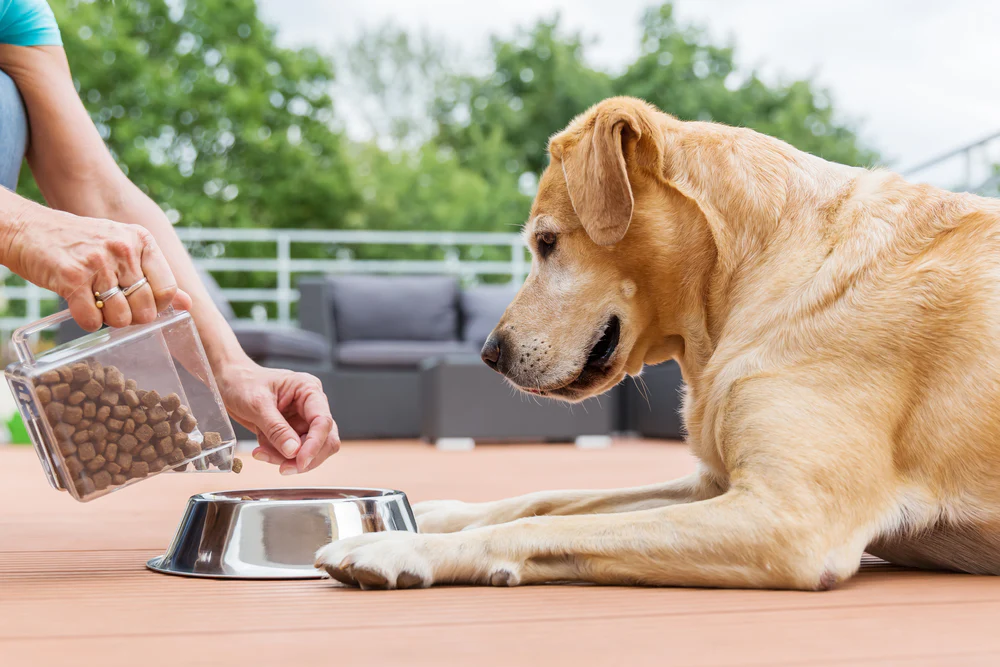
There are a ton of options when it comes to dog food, including grain-free options. Grain-free dog food is preferred by some owners because of their dogs’ sensitivities to grains, while others seek it out for the product’s theoretical advantages. Is it safe to give your dog a grain-free diet, and is it a good idea to do so?
The majority of dogs do great on commercial dog food; if your doctor advises specialty food, that’s a rare exception. If, however, your dog has developed a grain allergy, resulting in red spots, itchy skin, and hair loss, you may want to consider switching to a grain-free diet.
Is it safe to go to a grain-free diet, and would a grain-free diet be beneficial for your dog? While you should ultimately consult your veterinarian about your dog’s nutrition, it never hurts to arm yourself with as much knowledge as possible. Here’s everything you need to know before buying grain-free dog food.
Do Dogs Fare Better When Fed a Diet That Doesn’t Contain Grains?
You may be debating whether or not a grain-free diet is best for your dog. Truth be told, not even the greatest grain-free dog food has been shown in scientific trials to be superior than ordinary dog food. In the short term, you won’t observe any improvements in your dog’s health by switching to grain-free food.
Although it may seem like a good idea to feed your dog grain-free food, this is often not the case. Dogs, like people, need a varied diet rich in all the essential elements, some of which may be found in the grains used to make dog food. Due to a lack of essential nutrients, a grain-free diet might worsen cardiac conditions in dogs.
Canine dilated cardiomyopathy (DCM) is characterized by weak cardiac contractions and poor pumping power, and new research suggests that grain-free diets have a significant role in dogs with this ailment. Congestive heart failure symptoms, such as an enlarged heart and leaking heart valves, appear as DCM worsens.
According to the FDA’s 2018 report on their assessment of dogs with DCM, the majority of affected dogs (90%) were fed grain-free diets.
Dogs on BEG diets (boutique, exotic ingredient, grain-free) are also being studied for their possible connection to canine chronic pancreatitis.
Always consult your vet before deciding what dog food is best for your pet. Some canines may be allergic to common dog food components, while other canines may have special dietary needs. Dogs come in a wide range of shapes and sizes, and with just as many health issues, so too vary the meals we feed them. To find out what kind of dog food is best for your dog, you should consult with a vet.
What Are the Differences Between Regular and Gluten-Free Grains?
You, the pet parent, may be curious about the variations between grain-free and conventional dog food. The solution is more nuanced than just choosing a grain-free dog food. What effect the grains in standard dog food have on your dog’s health is something you should think about.
Dogs’ hearts need the grains included in dog food just as much as human hearts need the grains found in the human diet. In truth, dog food contains just those elements considered essential to a dog’s health. It’s especially vital to feed your dog a nutritious diet if it’s a very big or extremely little breed, for the reasons stated above.
The large proportions of peas, lentils, potatoes, and legume seeds included in many grain-free dog meals should also be taken into account. Overfeeding your dog with a diet with too many of these substances may lead to them receiving too much of one or more nutrients, which can have negative health effects. This is why it is crucial to consult your vet before moving your dog to a grain-free diet.
Given that grains in dog food have been shown to improve cardiac function, feeding a grain-free diet to a dog may increase their risk of developing cardiac issues. Dilated cardiomyopathy, which may lead to congestive heart failure, may be more common in dogs that have been on a grain-free diet for an extended period of time.
In spite of the lack of conclusive data that suggests grain-free diets are hazardous for all dogs or that grain-free dog food includes dangerous chemicals, it is still wise to feed your dog a balanced diet. By feeding your dog a balanced diet that includes grains, you can ensure that he gets the essential nutrients he needs to live a long and happy life.
What to Look for When Buying Dog Food
Selecting high-quality dog food is crucial if you want your pet to live a long, healthy life. Organic dog food, grain-free dog food, low-calorie dog food, standard dog food, and many more varieties may be found on the market today. Consider your dog’s breed, size, current health conditions, and dietary allergies to determine what kind of food is best for him.
When shopping for dog food, it’s crucial to take the dog’s breed into account. Various dog breeds mature to different sizes, and some are naturally more energetic than others. Some dog breeds, including labrador retrievers, may be predisposed to health issues if they are overweight.
If your dog needs to lose weight, you and your veterinarian may discuss low-fat diet options. There are a number of serious health problems associated with canine obesity, so it’s crucial that your dog stays at a healthy weight.
Brands of dog food exist that are designed for canines with unique dietary needs, such as diabetic dog food, dog food for canines with digestive problems, and dog food for canines with sensitive skin. Talk to your doctor about what kind of dog food is best for your dog if it appears to have troubles while eating particular kinds of dog food or if it has a health concern that needs a specific diet.
Frequently Asked Questions about Foods for Dogs without Grains
For what reason don’t dog food doctors advocate grain-free diets?
Grain-free dog food may not be recommended by your vet due to a lack of components that provide essential nutrients for canines. Grain consumption is associated with improved canine cardiovascular health. If your dog is on a grain-free diet, they may be missing out on essential nutrients that promote good cardiovascular health.
In addition, several of the components, such as lentils, peas, potatoes, and legume seeds, tend to be more concentrated in grain-free dog food. Your vet may advise against a grain-free diet due to the risk of nutritional deficiencies associated with it. In the end, it’s important to consult your vet before settling on a certain brand or kind of dog food.
When feeding a dog grain-free food, is there a risk of heart disease?
There is no conclusive proof that grain-free dog food is harmful to canines, but there is a link between this diet and dilated cardiomyopathy, a cardiac ailment that may cause heart failure and even death. Potentially at play here is the failure to provide enough amounts of specific nutrients crucial to maintaining canine cardiovascular health, which are often absent from grain-free diets.
Grain-free dog food may include higher concentrations of certain components, such as peas and lentils. The dog’s nutrition may become unbalanced if this continues for an extended length of time. Talk to your vet before giving your dog any new food.
What’s better for a dog, grain-free or full-grain food?
Maintaining your dog’s health requires feeding it a diet that provides the whole spectrum of nutrients. In the absence of a known food allergy, most veterinarians would advise you to feed your dog the standard fare available at pet stores. However, low-fat diets that inhibit weight growth could be preferable for bigger breeds.
Discussing your dog’s nutritional needs with your veterinarian is your best bet. Based on your dog’s breed, size, and health, your doctor might suggest a specific diet. If your dog is gaining weight or developing health problems after a diet change, you should see your veterinarian about trying a different kind of food.

In conclusion
Dogs with grain allergies may benefit from switching to a grain-free diet, but there are drawbacks to this approach. Talk to your doctor about the benefits and drawbacks of switching to a grain-free diet for your dog, as well as recommendations for the finest grain-free dog food.
Dutch is the easy option if you need some assistance providing the finest food for your dog. Using Dutch, you and your veterinarian may have a scheduled online video discussion regarding your dog’s diet, including the kind of food they should consume, the amount they should eat, and anything else you want to know. If you’re having trouble deciding which dog food to buy, give Dutch a try today.